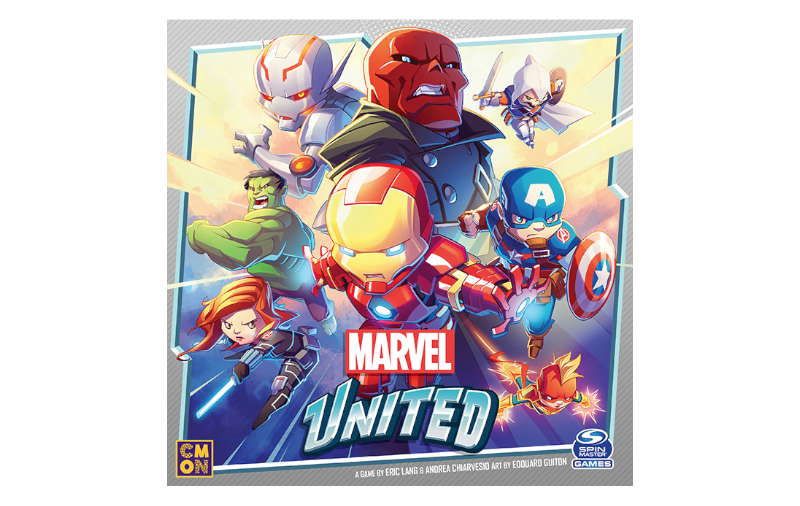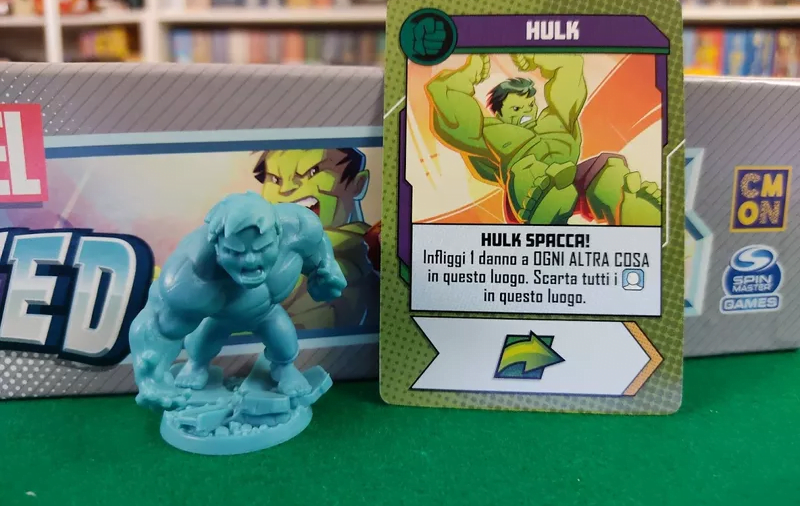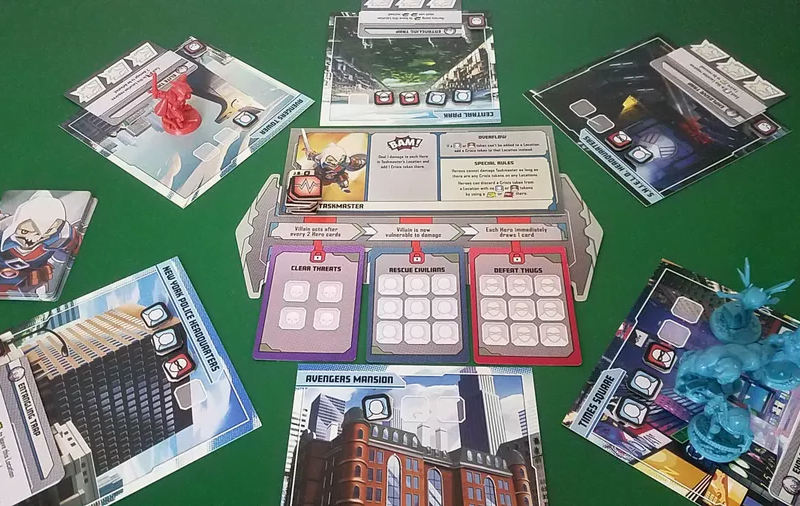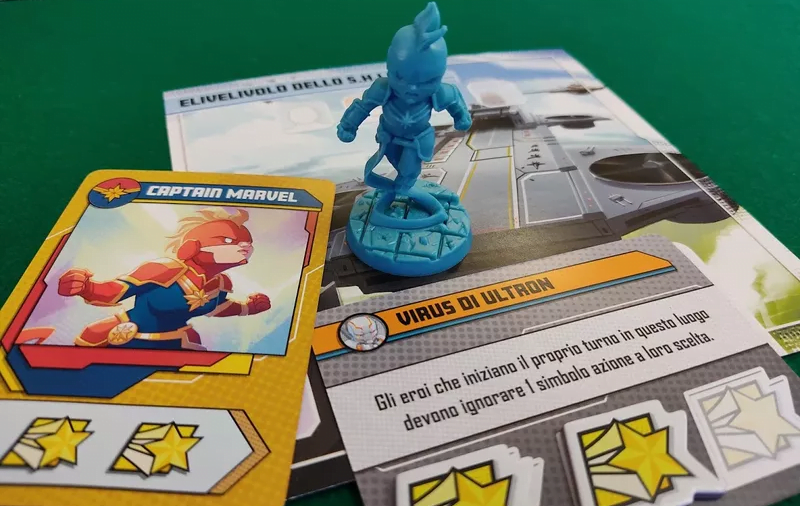CMON raised two million dollars to make a cooperative Marvel game that absolutely did not need miniatures, but got them anyway, and made them really kickass looking big-headed chibi miniatures. The game is fine. The game is perfectly tolerable. You can make a better game looking at it. Let’s look at it.
Stripped to the studs, I cannot help but like Marvel United. If I’m going to talk about it in a purely mechanical system, it’s a clock and line builder, which I mean, that feels like a different joke I’m too classy to make at the moment. Locationally, the players are moving around a clock, with six points that represent locations where things can go wrong, each having a thing that is going wrong on it, and once it’s done going wrong, you get a special ability from that place. There can be civilians needing rescues or thugs needing unrescuing on either of these, and sometimes special abilities, and then the villains’ plans make this location trickier to clean up as well, like they may have a subordinate villain or a special plot in action here. The players are playing cards into a line, which means over time your cards leave your deck and you don’t get to recycle them (per se). You get to use abilities on your cards, and the symbols on your cards, but also the symbols on the previous cards, so you can coordinate for big turns with other players, allowing for big, dramatic shifts in the flow of the game play.
Each player has their own deck of cards, those cards have the character on them, and you can play open or closed handed, depending on how much alpha gaming you’re concerned about going on at your tabletop. The villain has a little deck of their own and is doing things on their turn between your turns. The game starts with a bunch of things on fire, then gives you too few buckets, and leaves an arsonist running loose. Good stuff, it’s engaging out of the gate and you can get started and have fun once you’re done with the setup.
Which is fiddly.
The setup is full of little tokens and pieces that are meant to be for memory, and everyone has a unique deck and the player zones need to orient around a radial point and then the villain needs a deck and then you need a space for the ‘storyline’ that represents the totality of all the actions taken in the game and a villain board, and it all sits together on the table with the low key lurking mention of you’re going to have sort a lot of these when you want to put it back in the box. Not a deal breaker by any means but gosh it makes setting it up for the first time feel tricky. Like, did I miss a step? What are these little doohickeys for?
My defining feeling about Marvel United is not that it is, in any way, a bad game. It’s a pretty good game, honestly one I’d want in my collection if I didn’t have games that filled the same role and offered me more. The Marvel branding and the iconic miniatures are definitely draws with their own currency to them. The fact that the miniatures are miniatures is a big deal too, since it means you’re looking at objects you can handle and paint and engage with. If you like what this game is offering there is a truly staggering amount of it to go collect — from just twenty-dollar pickups of a new handful of heroes and villains to the eyewatering kickstarter promo set that runs up to three hundred dollars before shipping jammed full of licensed figures.
In every way this game is rolled out conveniently as a product with an accessible price, convenient store locations, online support and familiar branding. It’s a little frustrating then that this game is not as convenient, not as accessible as a game experience.
The game recommends you start with The Red Skull as your villain for your first game. So far so good, and it’s a pretty good place to start. It then tells players to ‘pick heroes,’ which is good but doesn’t quite prepare players for realising that the heroes’ special abilities can be extremely useful in concert with one another or fail to overlap at all. Another thing is that, due to the game being built around random card draw, it’s entirely possible for the villain to have a runaway opening to the game that new players should address immediately, but not recognise as such and then have no idea how to develop tools to dig themselves out of problems.
If you can’t tell, this happened to me.
It isn’t even like I don’t think games like this should be hard – but I do think losing a cooperative game on the third or fourth turn of playing directly asks how hard the game is to set up. For a game with a fast setup, yeah I guess that’s okay, just shove everything back into place and go go go again. In Marvel United’s case, though, the reset is cumbersome enough with the little pieces and the shuffling of all the decks that I feel like maybe, at least for the first player experience, there should be a little extra. Knowing more about the game meant in hindsight I could see what we were doing wrong. In our first turns, we were learning how cards worked and what they could do – we weren’t setting each other up in the same way. Plus, the idea of clearing civilians off a square with the Hulk’s attack felt like a ‘bad’ thing? We ‘shouldn’t’ do that? But then learning through the play experience that that was a thing our Hulk should be doing regularly to keep that space from getting overcrowded by the Red Skull’s sleeper agents, that didn’t come to our attention until after the whole thing was over and I was piecing together our failures.
There’s a mastery challenge here, one of those problems where playing the game makes you better at the game, and I feel like there’s a failure in this game of motivation, where the first time experience of the game wants you to just, you know, work it out and the way to do that is by failing. But I also think that I’m a big nerd for this kind of thing and that if the child and grandparent who played this game lost the game, they’d probably both shrug and either say ‘this game sucks’ or worse ‘I suck at this game.’ There’s no responsive feedback to it, there’s no clear indication of what they misidentified as important, because all the things that got swept into this happened early on.
I’ve talked about this when I talked about playing with your food or when scrabble ends, where sometimes a game can end before the game ends. If you lost the game on turn three, but the game doesn’t end until turn seven, you’re presented with a difficulty just tracking that. That’s the biggest weakness, I think, of Marvel United.
I am really glad I got this game for who I got it for. I wish for their sake that the game had built itself a little better for players who were going to be playing it the first time. This game raised two point six million dollars on kickstarter which says to me that it was made for the invested purchaser first and foremost.
Coulda just done more for the people who weren’t already fans though.



